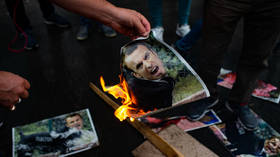French effort to tackle ‘radical Islamism’ is doomed if SPINELESS Macron no longer dares to mention it by name in new law

‘Don’t mention the ‘I’ word’ seems to be President Macron’s new strategy. After tough talk on Islamist separatism, he’s backed down on legislation to fight extremism and now wants Muslims to sign up to ‘Republican values’.
In announcing planned laws aimed at targeting radical Islamism, French President Emmanuel Macron has bowed to his liberal critics and watered down the draft legislation so that the problem he is aiming to address is not even mentioned. It’s so bloody polite.
And that is something of a surprise, because back in October, in the days following the shocking beheading of schoolteacher Samuel Paty by a teenage Chechen radical Islamist, Macron seized the initiative, announcing plans that had been in the pipeline for some time for an ‘anti-separatism’ raft of laws.
In a speech cheered by the growing right-of-centre population, he was unequivocal in identifying where he felt the problem lay. “What we must tackle is Islamist separatism,” he said. “A conscious, theorised, political-religious project is materialising through repeated deviations from the Republic’s values, which is often reflected by the formation of a counter-society as shown by children being taken out of school, the development of separate community sporting and cultural activities serving as a pretext for teaching principles which aren’t in accordance with the Republic’s laws. It’s indoctrination and, through this, the negation of our principles, gender equality and human dignity.”
Tough stuff indeed. But as the weeks have passed, his resolve seems to have crumbled under pressure. Remember, Macron, after all, is very much a liberal. So now we find that any mentions of radical Islamism or Islamist separatism in any of the 57 articles of the draft legislation have been scrapped, turning the plans into a proposed “draft law to strengthen Republican values.”
Somehow, in trying to make things better, the proposed new legislation has managed to make the situation worse. In failing to clearly identify the problematic radical Islamist elements among France’s Muslim population, it relies on a nod, a wink and a ‘you know who’ that leaves the eight percent of the population who are Muslim feeling unfairly targeted.
While it’s unfortunately true that a disproportionate number of French Muslims live in deprived ghettoes on the outskirts of the nation’s big cities, it seems that it is not from their numbers that the radical terrorists emerge.
The commonly held narrative is that mosques and religious schools in these communities are hotbeds for indoctrination. Away from the prying eyes of the French authorities, imams and teachers could be filling susceptible young minds with any old nonsense. Imaginations run wild. Keep these in check, and you’ve solved the problem.
However, as academic and Middle East expert Olivier Roy has found, this just isn’t the case. And if you look at media reports that detail the troubled life stories of the latest bunch of crazies to cause carnage in France, you have to agree.
Also on rt.com France hits the panic button to combat its Islamic ‘enemy within’. But is its new secularism law just symbolic virtue signaling?The terrorists come from backgrounds of petty crime, drugs, delinquency and violence and are encouraged by small groups of friends or relatives, using the internet to find support from extremist-authored documents and radical videos. The disclaimer that ‘the attacker was known to police’ is often a grim footnote to many a terrorist incident.
But this is not a radicalisation process restricted to Islamist terrorists. Extremists from the right wing, left wing, nationalist and secessionist cohorts all choose similar tools to construct their own radicalism. As Roy puts it, Islamism hasn’t been radicalised, radicalism has been Islamicised.
While France frets over foreign funding for mosques on home soil and bans the burqa, these seem like minor cultural titbits that politicians can squabble about. It makes it appear that they are doing something to address the very real fears that have emerged since the slaughter of hundreds in attacks at Charlie Hebdo’s offices, the Bataclan, Nice and elsewhere over the last five years.
According to an Ipsos survey of France’s Muslim population published earlier this year, 77 percent said they had no trouble practising their religion. However, the survey also found that 44 percent of French Muslims felt the rest of society had little regard for them.
Macron’s new legislation does nothing whatsoever to improve that, because talk of “Republican values” is clearly all about how they might conflict with Muslim beliefs, which are, logically, considered “non-Republican.”
The assumption seems to be that modern French Muslims favour Sharia law above all else, hold deeply conservative views on gender, sex and religious practices and live in a parallel society that is not compatible with the rest of the nation. But if they can just sign a declaration signalling their agreement, well, everyone can just get on with our lives.
This is all just window dressing.
It means nothing to a marginalised, unemployed, petty criminal in the northern suburbs of Paris and has no impact on his choices or of those around him. His decision to cut off an innocent person’s head with a machete while shouting “Allahau Akbar” is not fundamentally rooted in religious fervour. Radical Islamism is the result of extreme socio-economic failures made over the years by consecutive French governments – stretching way back to their time in Algeria – and their inability to do anything substantial about them.
This latest draft legislation is, quite simply, another failure. But until President Macron finds the courage to call a spade ‘a spade’ in French law and take any meaningful steps rather than play to the crowd, a solution will continue to elude him no matter how loudly he trumpets the magical “values of the Republic.”
Think your friends would be interested? Share this story!
The statements, views and opinions expressed in this column are solely those of the author and do not necessarily represent those of RT.
















